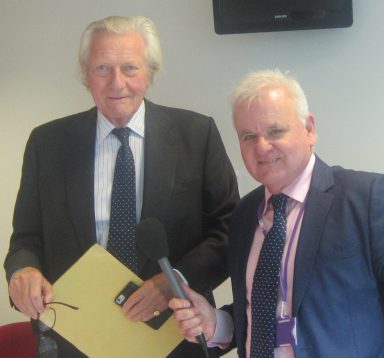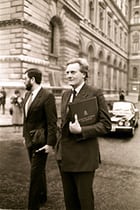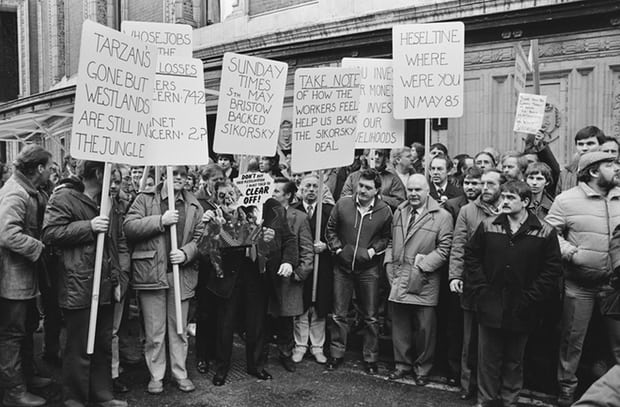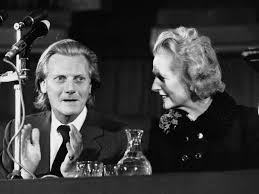Michael Heseltine was Secretary of State for Defence at the time of the Westland Affair 1985/86


Michael Heseltine, the former defence secretary, in Downing Street after storming out of a cabinet meeting during the Westland row January 1986

Westland workers take to the streets of London to protest about the government’s handling of the Westland crisis

Michael Heseltine with Prime Minister Margaret Thatcher
The Westland Affair brought Westland to the brink of financial collapse and led to the resignations of two Cabinet Ministers – Michael Heseltine as Secretary of State for Defence and Leon Brittan as Secretary of State for Trade and Industry.
Here, Michael Heseltine talks about his role in the Westland Affair and his fall-out with Prime Minister, Margaret Thatcher, that threatened to topple her Conservative government
The division of government responsibility is clear. I was interested in Westland as a Secretary of State for Defence because we obviously procured helicopters for the defence interests from that company. I was not responsible as Secretary of State for Industry for the overall policy towards the industrial base. So, at one removed, I knew about Westland’s problems and they were financial; they were in some considerable difficulty. Again, this was not my immediate responsibility to help the Company to solve this. But in the way of things, and being a large customer, my Department was drawn into the governmental dialogue to see if there was anything we could do. Like for example, paying our bills on time or, perhaps paying advance money towards development of new projects or, whatever it was. I knew of the problems with Westland, although it was not my responsibility and that I suppose would have been in 1985, maybe a little earlier.
The Americans were beginning to take an interest
I spent a lot of my time as Secretary of State for Defence negotiating with European colleagues the Euro-fighter deal and the outcome of that was that I was able to sign with the German, Italian, and Spanish Defence Secretaries, I think one of biggest deals Britain ever did, for the joint development of the Euro-fighter. So I knew the defence ministers and I knew the senior officials in Europe. In, I think October of 1985, I talked to Leon Britton, who was the Trade and Industry Secretary, who was responsible for Westland. And I said look I have just done this deal across Europe, would you like me to see if I can find a deal that would help Westland, because at that time the Americans were beginning to take an interest. And, Leon said yes he would be very grateful. And so I had the authority of the man responsible to hold discussions. I set out to do that and they went well. Of course, if you’re trying to bring other countries on board, it takes time and it began to develop seriously.
Sikorsky wanted to sell the Black Hawk helicopter
Then two British companies, two of our leading defence contractors; British Aerospace and General Electric joined in and became the lead parties, so to speak. So we had got a very serious grouping. At the same time, the Americans under Sikorsky UTC was the parent company, I think, wanted to sell to the Ministry of Defence the Black Hawk helicopter. This was a simple sales job, a perfectly respectable sales job, but my Department were adamant that they didn’t want it. It didn’t meet their operational requirements. And I had black and white submissions from the Air Force saying no this is not what we want. But the American interest didn’t go away. So you had this emerging issue; a British led European consortium taking some time to flesh out their proposals because, if you think about it, they were talking about a brand new helicopter; a four country partnership perhaps France, I think probably France was involved by that stage as well. And looking for a solution, of quite an imaginative nature, whereas all the Americans had to do is to say look here’s the helicopter we want you to buy it.
The Board of Westland was very keen on the American solution
This saga went on and it became apparent, I think that it was basically serious, that this British led option should have a chance of being properly considered. The Board of Westland was very keen on the American solution and it’s for them to explain why they were so keen. I can understand it, it was off the shelf, it was available and there was just one company. But the issue began to come before ministers and the crunch point came when Margaret called a meeting of the ministers most involved, and that’s the proper, perfectly proper thing to do, so this group, there would have been Foreign Office, there would have been Treasury, there would have been DTI (Department of Trade and Industry) and MOD in the room. And I put the case, the case for Westland was put, and Margaret lost the argument. Colleagues said I should be given the chance to develop the British led European offer. Margaret was very cross about that and she said she would take it to the Economic Committee of the Cabinet, which is frankly a very important committee. It’s almost the Cabinet itself. And that meeting took place, again the same line up, but much bigger but including John Cuckney, the Chairman of Westland, who had been brought in to try and influence the debate. Very, very rare for an outsider to be brought into a Cabinet Committee, anyway in he came and they lost. So the Cabinet, the Economic Committee, came out saying I should be given more time to develop the European led, British led European offer.
That was the point at which the row became difficult
Margaret was very, very cross with this and in a very intemperate way summed up by saying, very well we will meet again on Friday after the Stock Exchange has closed in order to determine this matter further. I was quite content I’d got the agreement of colleagues that any proposal would be put forward seriously. So the officials, the note takers, in the Cabinet Committee had been told to fix the meeting. And that early in the next week they called round and put it in peoples’ diary that the meeting would take place. On the Wednesday they cancelled the meeting and that was the point at which the row became difficult. I was quite clear that, as a Cabinet Minister first, I had won on the two occasions colleagues had discussed the matter. Secondly, I had a right to be heard in Cabinet. I made it clear that if the Cabinet, having heard my proposal rejected it, I would accept that. This was not people trying to make it anti-American, it was not anti-American it was simply, I had been asked by the Secretary of State for Industry to explore with European colleagues and British industry an alternative. And so my personal credibility as Secretary of State was in a very clear way on the line, you know, I had gone out I’d given undertakings, I’d told them that this was a serious offer, that had to be properly considered. And here I was being told that, I’m sorry, but, the Prime Minister doesn’t like this idea, regardless of what colleagues say. The Game is over.
It was a trap
I wasn’t prepared to accept that, and so there were a couple of Cabinets where I tried to raise the matter and the last of them took place in early January of 1986. When Margaret refused to allow the matter to be discussed and then she produced out of her handbag a manuscript piece of paper with a conclusion on it. Now this is unheard of. I mean the way that Prime Ministers are briefed, there is an official Civil Service Brief, a rehearsal of the likely arguments, there will be two or three conclusions that she may wish to draw. And we’ve all, all of us who have chaired these committees know exactly how it works, it’s a very sophisticated process and done, having checked out all the arguments across Whitehall. Out of the bag came this piece of paper, with a manuscript conclusion. The manuscript conclusion was perfectly clear. The debate in public will now stop, any Cabinet Minister who is asked any questions about this matter will refer the question to the Cabinet Secretary before answering them. And I knew when I heard this, it was a trap. So I said, Prime Minister, do I understand that, if I am asked the identical question that I answered last week tomorrow I have got to refer to the Cabinet Secretary before I answer it, to which she said yes. Well! You know, I would have been a laughing stock! The Times would have rung up and said, Secretary of State, last week we asked you a, b and c. This is what you said. What is your answer then? I have got to refer the answer to the Cabinet Secretary. I would have been the laughing stock. And what we now know, that would have been fuelled by Bernard Ingham and Charles Pole, Margaret’s apparatchiks in No 10. Because we know what they had done with Paddy Mayhew’s letter and Charles Moore’s book is fascinating in his second edition of Margaret’s biography. He’s obviously ashamed of what he discovered. So anyway, that was the nub of it all. And when I heard that, I knew I had to leave the Cabinet.
My resignation didn’t change the determination of the European and Brits to go ahead
The saga went on of course because there was then a ‘concert party’ to acquire the Westland shares, the Americans got control, they failed to sell their Black Hawk helicopter, as I told them they would and they sold the company back to the Europeans. The Americans never built the Black Hawk helicopter in this country. They never built anything that was relevant to the survival of Westland, having acquired it, so the one thing we know for certain is that the American ownership did not contribute to the future of Westland. What you cannot know, and I cannot know, is the precise form in which the European and British consortium would have: but the whole point of Arnold Weinstock and British Aerospace was they wanted to get their own designed helicopter and their own manufacturing capability, that’s what they were doing it for. So they would have worked out with the Ministry of Defence the requirements of the Ministry and then produced it. My resignation didn’t change the determination of the European and Brits to go ahead. And British Aerospace, under Sir Raymond Lygoe, the Chief Executive at the time, found that there was a holding of shares in Westland, I think in the hands of a Bank, Flemings I think that’s what it was. And they discovered this and they were in discussion to buy those Fleming shares. I think that was on a Friday. If I remember correctly over the weekend James Hanson, who was a fan of Margaret Thatcher’s paid cash to buy those shares and in short order a group of people which included, I think, Rupert Murdoch, through TNT in America. But later we discovered that it was Jimmy Goldsmith, all of whom were the sort of people who had close supporting relationships with Mrs Thatcher. They bought these shares; that’s how America got control of it. It was a group of people acting in ‘concert’ that did it. And we didn’t even know this at the time because there was always a missing factor. And that was the South American member of the consortium, and it was John Nott, who was, of course, a former Secretary of State for Defence and then Chairman of the bank, that acted for Sikorsky, who produced a biography revealing that. I think the words he used in the book were; Michael Heseltine never knew who the fourth member was, it was Jimmy Goldsmith. That was in John Nott’s book, it wasn’t me. I didn’t invent any of this. The issue was black and white. The MOD did not want the Black Hawk helicopter. The Americans made all sorts of promises but sold back to the Europeans when they failed to sell the Black Hawk Helicopter. So all the things I said were true and were proven to be true. There isn’t any other explanation, except Margaret’s obdurate resistance to anything that had a word like Europe attached to it.
There must be somebody I can talk to who can stop this nonsense
There is one moment which might have led to a different result. I could see the row brewing up, and there’s always a possibility in rows of this sort that it is the dialogue of the deaf, that no-one is actually listening to the other side. And I could see where it was going and so I said look there must be somebody I can talk to who can stop this nonsense. And there were two candidates; one was Willie Whitelaw and the other was Quinton Hailsham. Very distinguished senior figures in the Cabinet. So I put a phone call through to both of them. And I think Quinton was in America and Willie was somewhere, God knows what he was doing. I couldn’t get through to either of them. I think if I had got through, particularly to Willie, I might have been able to persuade him to get Margaret in a room with me and see where we go, you know. It might have been possible, and it didn’t happen. And so there is no point in crying over that.
There was no thought in my mind of a leadership challenge against Mrs Thatcher
My opponents turned this into a great leadership bid, a great conspiracy and all this stuff. It’s complete fiction of their imagination. First of all, I didn’t make any attempt to lobby the Cabinet and. secondly, there was no thought in my mind of a leadership challenge against Mrs Thatcher at that stage. And if there had been, I would have behaved in ways totally different to the way I did.
I saw my job as to deliver the policies of the Government
A criticism of me, which is a legitimate one, is I didn’t spend much time in the House of Commons. I wasn’t in the tea rooms, chatting up the Members. And I wasn’t, I know I wasn’t, and I know why, because I saw my job as to deliver the policies of the Government and I would be judged, in my view, by the Prime Minister on the success or otherwise of my job as a Minister. I was not campaigning to be preferred by parliamentarians in any way. And that is a common judgement about me, and a criticism of me, if you wanted to be leader why didn’t you go and make friends. So I am afraid the whole conspiracy theory that was some design of challenging Margaret Thatcher has got no ground whatsoever, no truth in it at all.








No Comments
Add a comment about this page